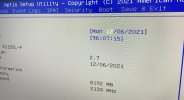Did some tests with installer CD (slow boot, enough time to press keys before boot menu is displayed).I don't think it's a stuck key, that would show up when the machine's booted too.
There is indeed no keyboard queue clearing.
And it also depends which key(s) are pressed.
For example PgDn stops, End does not.
Furthermore, these non-printable keys also are not shown.
Again the question: Is it good practice to not clear the keyboard queue?
The key seems that the countdown is not being displayed in case there is something in the keyboard queue.
So I guess the bug that affects the OP consists in using the tickless HPET timer instead of the traditional timer.
nero, could you please try this setting in /boot/loader.conf?
Code:
kern.eventtimer.periodic = 1
